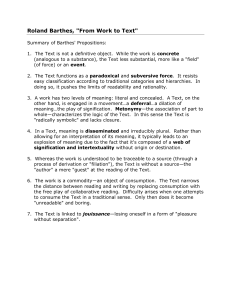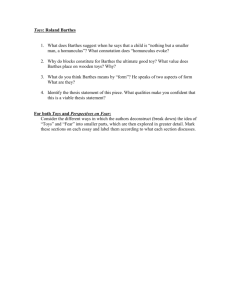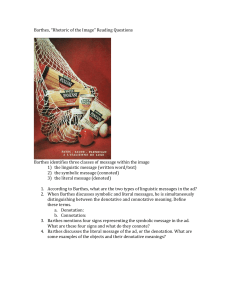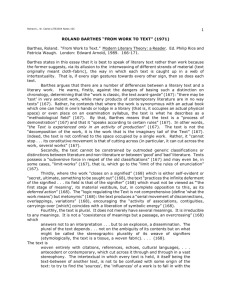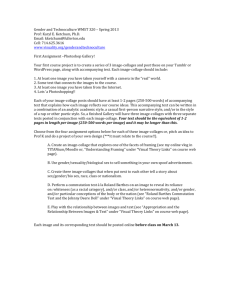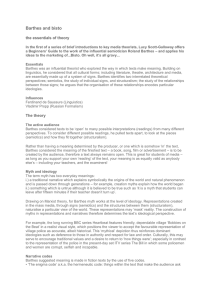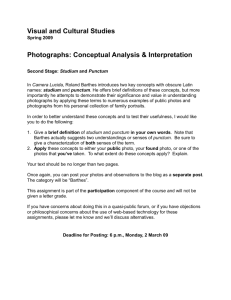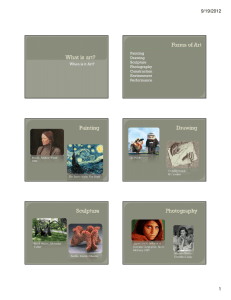Positive critics
advertisement
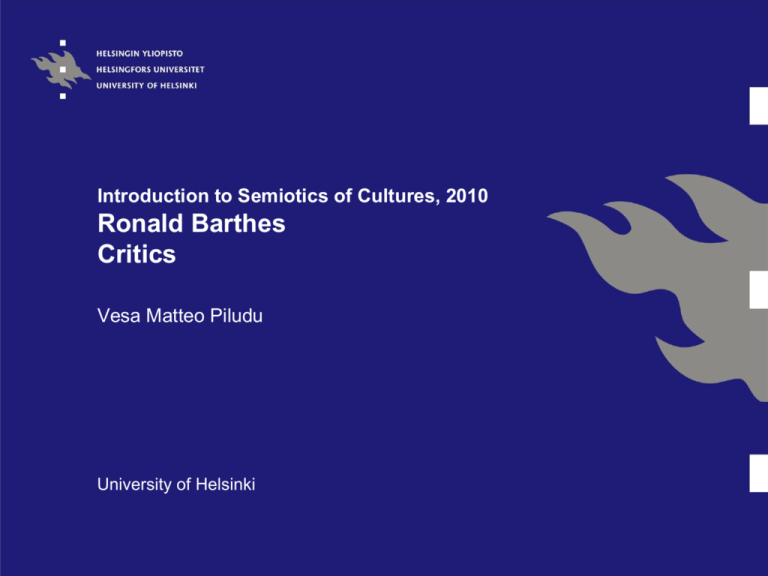
Introduction to Semiotics of Cultures, 2010 Ronald Barthes Critics Vesa Matteo Piludu University of Helsinki Positive critics: writing style Writing stile: clear in the first part of the book Use of irony: an important rhetoric quality since antiquity Great capacity to create neologisms. Positive critics: contents The phenomena described by Barthes are still present in popular culture after 50 years, even if they are presented in a different way Commercials and propaganda’s text are even more idiot, and even more dangerous Today we need desperately critical studies about the media manipulations Barthes has “opened the way” to media criticism Positive critics The book of Barthes was one of the first on popular culture, so it has opened the way to a new field of study Barthes applied concepts generally used only in Classical or Ethnologic studies to popular culture He demonstrated that our “rational” and modern culture is full of irrational elements: popular culture is mythological as an ethnic society Negative critics: methods In all the book there the scientific references are very few The last chapter, the theoretical one, is written later The writing stile is somewhat obscure and sometimes is not very easy to connect the speculation with the previous example of popular myths The text is theoretically poor: Barthes seems to be inspired only by De Saussure, structural linguistics, Marx and the existentialist The ideas of Barthes seems to be strongly self-referential, even if they are strongly connected to the intellectual environment of the time Reference to previous cultural studies are minimal, compared to the texts of Lévi-Strauss written in the same period The Barthes’ paradox Barthes is writing all the time about the importance of history, but in Mythologies there is few history He is not describing the origin of the modern myths in detail Balanced critics: theory The myths of Barthes works well for simple texts of popular culture (commercial, political propaganda, blockbuster films) Not all in popular culture is mythological And what about polyphony? Not all in popular culture is so simple and schematic: a song of Bob Dylan or Leonard Cohen doesn’t fit well in the model, a comic of Corto Maltese, with references to history and esoterism is much more complicate that Spider Man or Batgirl Intertexuality (reference to other texts) exist in popular culture: in Sympathy for the Devil, the Rolling Stones refers to Bulkakov’s Master and Margarita Of course, good and well documented journalism exists, even in television Something that fit in the wrestling-villain model Something that doesn’t fit in the model: Corto Maltese’s intertextuality Corto Maltese’s intertextuality? Corto Maltese: ethnologic attitude and precision Reference to Danakil tea culture / vs. coffee Hugo Pratt’s sketches Actors and interpretation cancelled The myths of Barthes are cancelling the authors and the interpretation: Who is writing commercials? Why? Who is receiving them? In what way? We react to commercial and propaganda in the same way? Obviously not! Some propaganda texts failed completely The media power is obviously strong, but not absolute Popular myths are oppressive, but sometimes ephemeral: pop icons (singers, actors) changes continuously, they aren’t so strong and fixed as ancient Greek heroes There is also dynamism, not only the repetition of the same slogans Even so… The negative critics doesn’t cover the value of a classic, that have inspired other scientists both in positive and negative ways We are learning also understanding the methodological mistakes of our predecessor All the scientific classic are heavily criticized and is a positive think, part of science: it’s normal If the relevant scholars aren’t criticized, we step into religious/scientific sects: a scholar, as Barthes or Lévi-Strauss became divinized (a myth itself) and the next generation aren’t producing nothing new In the ‘70 the blind admiration for Lévi-Strauss has created some dangerous sects (many scholars has tried to apply his theories to the most different fields) Problem: The ideological or theoric background have changed Of course, it is not necessary to have the same political ideas or theoretical background to read Barthes Obviously, is not required to be a member of the local MarxistExistentialist-Structuralist party (if something like that has ever existed) to understand the text Is not necessary be a fox to study a fox, or a French to study French literature, or an anthropologist to read Lévi-Strauss If we read only what fit to our ideals, there is the risk of became member of scientific sects the analysis of classics requires, first of all, an open mind and curiosity A true scholar masters all scientific literature of his field, including all that is considered surpassed It’s difficult to write something new without a deep knowledge of previous scientific literature Correct attitude toward a classic It’s necessary to read, first of all, the essay itself, not just a basic commentary on the text with a ready-made interpretation After that, different critics (both positive, negative and balanced) about the book and the methodology Comparison with other authors and theories (similar and very different ones) is always useful Formation of your own point of view, that should be motivated seriously, using correctly the bibliography available The personal point of view should be different from a “personal opinion” or a “currently accepted opinion” It too easy to judge an author considering only the last critics: it leads to scientific conformism (I say so … because all the others, or the most appreciate scholars are saying so) or scientific fashion (now the theoretical background is so … let’s follow the river) Science isn’t Spring-Summer fashion 2010: Fresh air and all the previous models in the trash! Science is no inquisition or censorship … … nor a Society for the Suppression of Vice And remember … no one is perfect, including us
